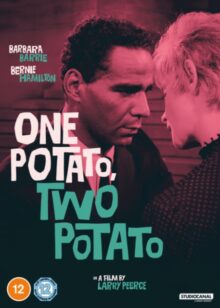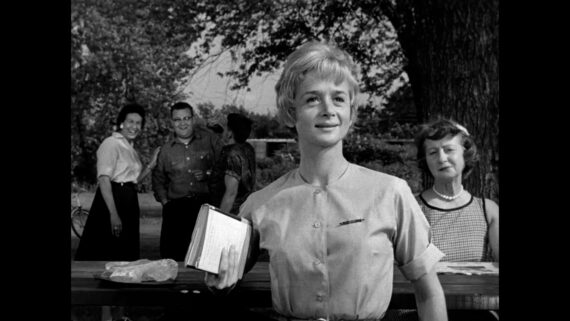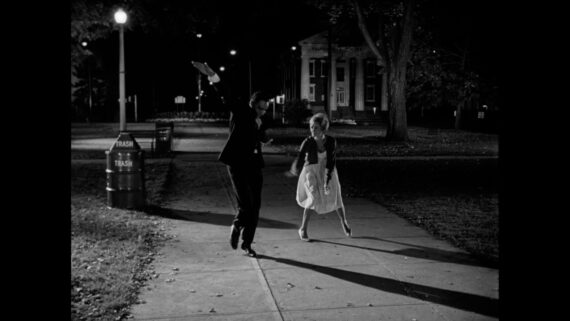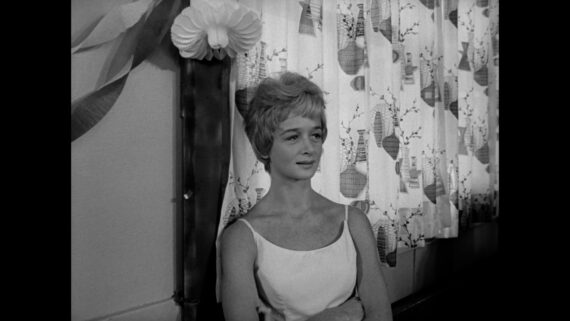 Director: Larry Peerce
Director: Larry Peerce
Screenplay: Orville H. Hampton, Raphael Hayes
Producers: Sam Weston
Starring: Barbara Barrie, Bernie Hamilton, Richard Mulligan
Year: 1964
Country: USA
BBFC Certification: 12
Duration: 83 mins
There was a time between when One Potato, Two Potato came out and the time I’m writing this review when the subject of interracial marriage was considerably less controversial but, in the hopefully temporary but debilitatingly prevalent toxic environment in which we currently find ourselves existing, the racist attitudes at the centre of this film are on the rise to the extent that One Potato, Two Potato once again feels like a hot potato. While this has more to do with the failings of society than the successes of the film, One Potato, Two Potato examines its subject matter with such astute sensitivity that it would resonate in any cultural climate as both a snapshot of times past and a cautionary tale about the repercussions of validating ignorance.
Studiocanal’s excellent new release of this largely forgotten film is timely indeed. Predating the more famous but far more compromised Guess Who’s Coming to Dinner by three years, One Potato, Two Potato only found tentative acceptance from the Academy. The screenplay by Orville H. Hampton and Raphael Hayes received an Oscar nomination but Barbara Barrie, whose powerful central performance emerged victorious at Cannes, was overlooked. Independent race-themed films like One Potato, Two Potato and the same year’s Nothing But a Man were, however, laying the table for Guess Who’s Coming to Dinner’s greater commercial success. The latter, with its dated and clunkily problematic approach, is now mostly enjoyable as a well-meaning Hollywood bauble (and I do, for all its failings, enjoy it) but these earlier, rougher-edged indies still hit hard.

One Potato, Two Potato tells the story of Julie Cullen and Frank Richards, she a young, white divorcee whose husband abandoned her and their one year old daughter, he a friendly black coworker whose rapidly growing friendship with Julie soon develops into much more. Though they face opposition from disapproving onlookers and Frank’s own parents, Frank and Julie marry and have a child of their own. With Frank seamlessly forming a parental bond with Julie’s daughter Ellen, they establish a happy home together. But when Julie’s ex-husband Joe appears seeking reconciliation, his wounded pride at being rejected is exacerbated by his deep-seated racial prejudices. Joe petitions the court for legal custody of Ellen, on the grounds that an interracial home is not a stable environment to raise a child. Although Frank’s father advises them to pack up their family and leave the state, Julie and Frank determine to stay and fight the case.
It’s hard to get into exactly what is so special about One Potato, Two Potato without dropping major spoilers, so be aware that I will be discussing the ending of the film. Suffice it to say, this is not Guess Who’s Coming to Dinner or Kramer vs. Kramer. In presenting an accurate picture of the prejudiced legal system of the time, One Potato, Two Potato cannot append a forced happy ending, even as it makes the audience long for one more than anything. While my heart broke when watching the final inevitable scene play out, I was ultimately glad that the film did not destroy itself at the last minute in order to offer a more commercially viable climax.

The subject of interracial romance has subsequently been covered many times so initially One Potato, Two Potato feels a bit overfamiliar and requires the viewer to adjust to the mindset of the average 1964 audience member in order to appreciate its trailblazing credentials. But as the story goes on, One Potato, Two Potato becomes so involving on the level of character and situation that its various debates become more than mere speechifying moments assigned to different characters. The angles from which the screenplay comes at the various obstacles in the path of Julie and Frank are complex and considered. A lesser film would have portrayed Frank’s parents’ opposition to their union as merely the flipside of the white aggressors’ prejudices but the film refuses to fall into this “bad people on both sides” way of thinking. Instead, it acknowledges that the black characters object out of fear born of their own experiences with prejudice, and of a loving protectiveness for their son. In acknowledging this viewpoint as understandable, One Potato, Two Potato doesn’t feel the need to validate it, and the fact that Frank’s parents come round to their new daughter-in-law shows the crucial capacity for change. Even more importantly, it is this fear of the effects of prejudice that ultimately lead to the white judge’s ruling. He acknowledges the need to fight against racism but is not willing to be a part of that fight.
One Potato, Two Potato is a raw, brilliantly uncluttered film which served as a hell of a calling card for first-time director Larry Preece whose subsequent films included The Incident and Goodbye, Columbus. Though it is rough around the edges, this independent spirit works in the film’s favour. The final caption connects its story with several real cases that yielded similar verdicts and the lack of Hollywood glamour helps that message to hit harder. The one peculiar choice is the jarringly upbeat music over the closing credits, which clashes terribly with that devastating and phenomenally staged final scene. It’s a minor quibble but it caused my tear-stained face to suddenly snap into an expression of befuddled amusement at the worst possible time. Without that single eleventh hour misstep, I think I may have given One Potato, Two Potato a perfect score.

One Potato, Two Potato is released on DVD and Blu-ray by Studiocanal on 13 October 2025. The extras include several insightful and informative interviews about the film, as well as a feature commentary. It’s a fairly no-frills package that fits the tone of the release perfectly. Special features are as follows:
-Breaking New Ground – An Interview with Barbara Barrie
-How We Made It: An Interview with Larry Peerce
-Audio Commentary by Film Historian and Critic Sergio Mims
-Introduction by Jean-Baptiste Thoret
-Analysis by Régis Dubois


Leave a Reply